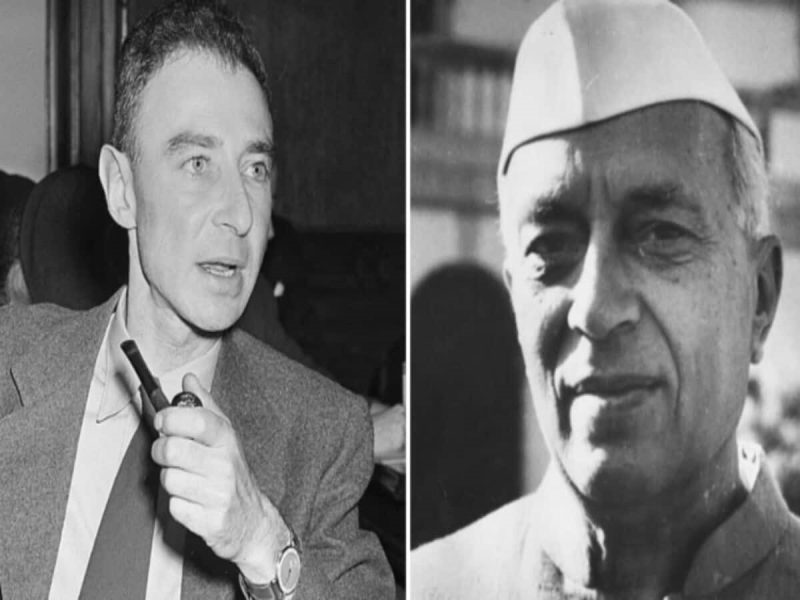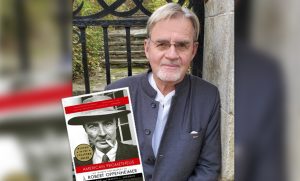
When Jawaharlal Nehru asked Oppenheimer to take Indian citizenship

Even as movie buffs are flocking to watch Christopher Nolan’s ‘Oppenheimer’ in theatres in India, Kai Bird, the co-author of the biography on the controversial theoretical scientist, revealed that Indian Prime Minister Jawaharlal Nehru had once offered citizenship to the ‘Father of the atom bomb’. This was when Oppenheimer was vilified by the United States Atomic Energy Commission in 1954 for having Communist sympathies and stripped off his security clearance.
In an interview with Hindustan Times, Bird, the co-author of the book, ‘American Prometheus: The Triumph and Tragedy of J Robert Oppenheimer’ revealed that after Oppenheimer was humiliated in 1954, Nehru told him to come to India and become a citizen.

But, Bird also said that he did not think Oppenheimer considered the offer seriously because he was a deeply patriotic American. Another news report said that it was Oppenheimer’s friend Homi Jehangir Bhabha, on seeing him harassed in the US asked Nehru to invite Oppenheimer to settle down in India.
Nine years after Oppenheimer was celebrated as a great scientist for having developed the atom bomb, which was used in World War II and effectively ended the war, he was hauled before a “terrible kangaroo court” headed by senior member of the AEC, Lewis Strauss (played by Robert Downey Jr i n the film). He was accused of being a Communist sympathiser and became a victim of the infamous McCarthy witch-hunts in America then.
Feared victory of fascism
On creating the atom bomb, Bird said in the HT report that the scientist who was a Jew was motivated by his fear that the Germans would make the bomb and Hitler would win the world war. And he was worried that it will be a victory for fascism worldwide. For this reason, he felt the atom bomb was necessary.
There are enough stories about how Oppenheimer felt torn between feelings of pride and guilt for having created the atom bomb, an ultimate weapon of destruction. According to Bird, Oppenheimer had mixed feelings after the Hiroshima and Nagasaki bombings. Some of the physicists and scientists in the spring of 1945, met to discuss the future of “this terrible weapon of mass destruction”. The Germans had been defeated, Hitler was dead and the Japanese did not have a bomb project.
Also read: Oppenheimer review: Breathtaking visuals, enigmatic Murphy make for a flawed yet thrilling fare
But Oppenheimer is supposed to have told them that the Japanese were still fighting. And quoted Niels Bohr, the great Danish physicist who had asked Oppenheimer if what they had built is “ big enough?” to end all wars? As opposed to a situation in which two or three adversaries in a war would each have their own version of nuclear weapons.
Bird also said in the report that Oppenheimer was however “terribly troubled” after the bombs were dropped in 1945 on Hiroshima and Nagasaki. He read that tens of thousands of people had been instantly burned to death. And, according to Bird, he actually plunged into a deep depression after the two bombings. But he quickly recovered and turned against nuclear weapons.
In a speech in October 1954, he called his creation a weapon of terror. And said that they were not defensive weapons and they were used on an essentially already defeated enemy. By then, Oppenheimer learnt that Japan had been close to surrendering when the bombs were dropped. So, Bird said that Oppenheimer spent the rest of his life trying to persuade policymakers that they should create an international arms control regime.
Further, Bird speaking on Oppenheimer’s fascination for the ‘Bhagwad Gita’ said he was interested in the book because as a quantum physicist he was drawn to topics on mysticism and philosophy. He was trying to understand time and space which the Gita was tackling at some level, said Bird.
Also read: Who was Oppenheimer? Read about genius scientist, a bundle of contradictions
And his famous line after the first detonation of a nuclear weapon of ‘I am death, destroyer of the world’ — some Sanskrit scholars felt the more accurate translation would be ‘I am Time, destroyer of worlds’, said Bird in the report.
Oppenheimer’s story is incredibly relevant because of the war in Ukraine and the way Russian President Vladimir Putin has been threatening to use tactical nuclear weapons, said Bird in the interview. According to the author, the story is not over. And it may end badly still as these weapons could still be used again.
Bird said the world is poised for another revolution with artificial intelligence (AI). And predicted that AI will impact employment, and our whole culture, even as it questions issues of privacy. He also felt that it was a frightening prospect that people were talking about AI being used to trigger the use of nuclear weapons.


